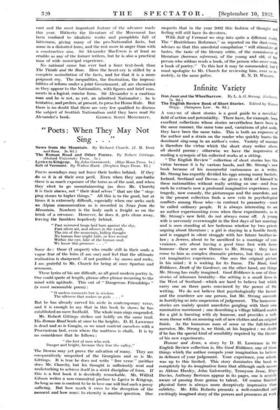" Poets : When They May Not Sing . .
."
POETS nowadays may not leave their bodies behind. If they do so it is at their own peril. Even when they sun-bathe -there is as much exposure of the torso as of the soul, and when they elect to go mountaineering (as does Mr. Church) it is their sinews, not "their dead selves " that are the "step- ping stones to higher things." All this is to the good, but at times it is extremely difficult, especially when one seeks such an Alpine consummation as is recorded in News from the Mountain. Nowhere is the body such a freight as on the brink of a crevasse. However, he does it, gets clean away, leaving the fumblers hopelessly behind.
"Past mirrored fangs laid bare against the sky, Past silent air, and silence in the vault, The iris of the mountain, hiding thought No human fear might hide, or love reveal Within the eye, lake of the human soul. We know this presence . . . "
Some do : those (I suspect) who cradle still in their souls a vague fear of the loins (I am one) and feel that the ultimate realization is sharpened—if not purified—by snows and rocks. I am grateful to Mr. Church for being at once Spartan and sensuous.
These lyrics of his are difficult, as all good modern poetry is. One could quote at length, phrase after phrase recurring to the mind with aptitude. This out of "Dangerous Friendships" (a most memorable poem) :
"0 useless moments lost in wisdom The idleness that makes us gods . .
But he has already carved his niche in contemporary verse, and it is enough to say that in this book he shows he has established no mere foothold. The whole man sings suspended.
Mr. Robert Gittings strikes out boldly on the same trail. His Roman Road leads at once to the heights. D. H. Lawrence is dead and so is Gaugin, so we must content ourselves with a Procrustean bed, even where the mattress is chalk. It is by no coincidence that he follows :
"the feet of men who seek Danger and height, because they fear the valley."
The Downs may yet prove the salvation of many. They are comparatively unspotted of the Georgians and so is Mr. Gittings. It is true he does not write "free verse" (neither does Mr. Church), but his thought is sufficiently neat and undisturbing to achieve itself in a strict discipline of form. If this is a first book it is decidedly remarkable. Mr. Wilfrid Gibson writes a non-committal preface to Lyrics to Kingcup. So long as one is content to be in love one will find such a poesy sufficing. But how much it owes to the deception of the moment and how much to eternity is another question. One
1.1
suspects that in the year 2002 this fashion of thought and feeling will still have its devotees.
With Salt of Vermont we step into quite a different world. The "Brattleboro Reformer," as reported on the dust-cover, advises us that this anecdotal compilation "will stimulate as tastes, the taste of the literary critic, of the connoisseur et literature (horresco referrens), of the young and old, of the person who seldom reads a book, of the person who never reads a book of poetry." To this last it may be commended, but I must apologize to Mr. Church for reviewing him, ever so re.






























 Previous page
Previous page